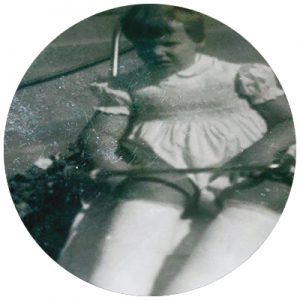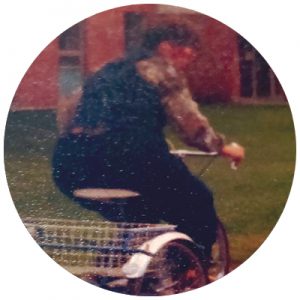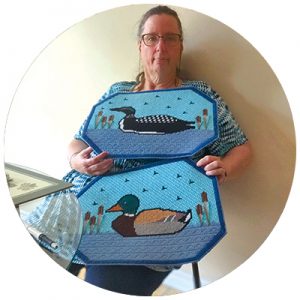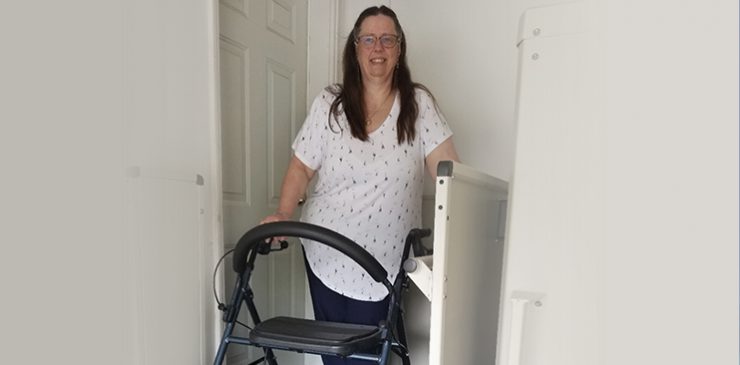Clara, who is 61, lives with her 89-year-old father Hilbert in an Ottawa bungalow. They plan to live independently for as long as possible with the support of their family, friends and community.
Clara and Hilbert both use walkers for mobility and stability, but for different causes. Hilbert’s is from aging and Clara’s is from the secondary conditions related to spina bifida – weakened muscles and joints, which led to a series of falls in her 30s and 40s. Together, Clara and Hilbert have learned to accommodate and adjust to the changes in their mobility and find ways to help each other.

Clara grew up in Winchester, Ontario. Three days after her birth, she was taken by night train with a nurse to Sick Kids Hospital in Toronto for surgery to close her back; one of about seven surgeries. While in hospital, her parents received regular progress updates by telegram until Clara returned home several weeks later. She learned to walk when she was six and got around without braces or canes until well into her adulthood.
Clara attended mainstream school and was treated the same as her peers, except that she avoided field trips because she could not walk distances. She had friends and a typical childhood, for the most part. She rode an adult tricycle around her neighbourhood.
Clara credits her parents with her success and believes she would not be where she is today without their support and encouragement. They taught her to drive and made sure she had an education. Clara graduated from Algonquin College with a diploma in Administrative Secretarial work. Her 30-year career in the federal public service included various departments such as National Defence and Transport Canada.

Whenever she had medical appointments, her father, who worked as a hospital administrator at the Winchester District Memorial Hospital, would take time off work. Today, her brother Doug attends medical appointments as her advocate. Clara often goes to medical appointments with her Dad to advocate for him. Doug and his wife Lyne live nearby and help when they can.
Now that Clara is experiencing further changes to her health and mobility, she is considering getting a motorized wheelchair. She swims to stay fit. She may soon have further surgery to correct her tethered spinal cord as she is experiencing numbness in her leg and has more fatigue.
She is grateful to Angela Clair, regional services co-ordinator at SCIO in Ottawa, who she met through a friend. Angela visited Clara at home and suggested that a lift would be more practical than stairs for getting into her SUV. Angela provided the contact information for several local companies that install vertical platform lifts. The Good Access Company came to Clara’s home to determine the best type of lift. Clara and her Dad both find the lift has made daily living a lot easier.
Since Clara’s father no longer drives, Clara drives them around. In addition to help from her brother Doug and his wife Lyne, a home care worker visits three times a week.
When she is driving, she looks for full-service gas stations, which are easier to maneuver, but harder to find. Although accessibility is improving for people with disabilities, she finds that older buildings are not as accessible. For example, she has arranged for church meetings at her home during the winter months as the church isn’t accessible.

Clara is active in her church craft group and enjoys plastic canvas needlepoint, which she learned while vacationing in Florida. Her creations range from coasters, placemats and wall hangings to an entire Christmas village.
Clara also attends social groups like the Ottawa Tasters Club for adults with spina bifida/ hydrocephalus. She has made many friends who also share her interests and experiences. She also enjoys attending Peer Connections events at the Ottawa Hospital Rehabilitation Centre.
Although Clara is concerned about changes to her disability, she knows she has the support to face whatever happens. She is grateful to her parents for giving her a sound foundation and resilience to prepare for life ahead.






